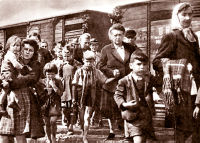- Operation Black Tulip
-
For the novel, see The Black Tulip.

Flight and expulsion of Germans
during and after World War II(demographic estimates) Background German exodus from Eastern Europe
Nazi-Soviet population transfers
Potsdam AgreementWartime flight and evacuation German evacuation
East PrussiaPost-war flight and expulsion Czechoslovakia
Poland (incl. former German territories)
Netherlands
RomaniaLater emigration Emigration from Poland Operation Black Tulip was a plan in 1945 by Dutch minister of Justice Kolfschoten to evict all Germans from the Netherlands. The operation lasted from 1946 to 1948 and in the end 3,691 Germans (15% of German residents in the Netherlands) were deported.
Contents
Background
After World War II, the Netherlands was a country in ruins and the major pre-war trade lines with Germany and Indonesia were severed. Because of the importance of trade with Germany, the proposed demand for compensation (25 billion Guilders—a tenfold of the actual damage) was dropped. But there was still a lot of resentment. Many people were arrested, most notably collaborator (NSB). The 25,000 people living in the Netherlands with German nationality (who often had Dutch wives and children) were branded as 'hostile subjects' (vijandelijke onderdanen). They were to be evicted in three groups in reverse order of entry. The first who had to leave were those who came after the start of the war (mostly factory workers), then those who came after 1932 (including political refugees, some of them Jews) and then the rest, many of whom were economic refugees from the 1920s.
During the war many of these Germans had been drafted into the German army or otherwise enlisted by the invaders against their will, and their children were sent to separate German schools. Quite often neighbours had not known that they were Germans. When they were to be evicted many neighbours filed protests, which could lead to their release. Another way the Germans could avoid eviction was to show that they were essential to the Dutch economy. If they were, any pro-Nazi sentiments they might have had might be overlooked. Also, it was decided not to evict those who emigrated to the Netherlands before the war and who had proven themselves good Dutch citizens. Those who had helped the Dutch resistance were unlikely to be deported.
Timeline
The operation started on 11 September 1946 in Amsterdam, where Germans and their families were taken from their homes in the middle of the night and given one hour to collect fifty kilogrammes of luggage. They were allowed to take one hundred Guilders. The rest of their possessions went to the state. They were taken to internment camps near the German border, the biggest of which was Mariënbosch near Nijmegen.[1]
The allied forces that occupied Western Germany didn't like this operation because other countries might follow suit and western Germany was in too bad a state to receive all these newcomers. The British troops in Germany reacted by evicting 100,000 Dutch citizens in Germany to the Netherlands.[1]
The operation ended in 1948, and on 26 July 1951, the state of war with Germany officially ended, the Germans no longer being regarded as state enemies.
Documentary
An episode of the Dutch TV show Andere Tijden was devoted to these events.
See also
Notes
Literature
- (Dutch) Bogaarts, Melchior D. (1995), "Weg met de moffen", Parlementaire geschiedenis van Nederland na 1945, D (2 ed.), Nijmegen, ISBN 9071478378.
- (Dutch) Bogaarts, M. D. (1981), "'Weg met de Moffen' – De uitwijzing van Duitse ongewenste vreemdelingen uit Nederland na 1945", Bijdragen en Mededelingen betreffende de Geschiedenis der Nederlanden (The Low Countries Historical Review) (Koninklijk Nederlands Historisch Genootschap (Royal Netherlands Historical Society)) 96 (2): 334–351, http://www.knhg.nl/bmgn2/B/Bogaarts__M._D._-_Weg_met_de_Moffen._De_uitwijzing_van_Dui.pdf
External links
- (Dutch) the documentary Black Tulip.
Categories:- Anti-German sentiment
- 20th century in the Netherlands
- 1945 in the Netherlands
- 1946 in the Netherlands
- 1947 in the Netherlands
- 1948 in the Netherlands
- Ethnic cleansing of Germans
- Deportation
- Forced migration
- Aftermath of World War II
- German diaspora
- Germany–Netherlands relations
Wikimedia Foundation. 2010.
